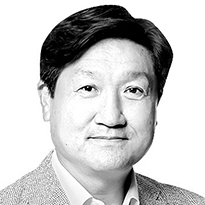
Ahn Byung-seok
The author is special professor at Pyeongtaek University and former deputy commander of the ROK-U.S. Combined Forces Command.
General Jin Young-seung, chairman of the Joint Chiefs of Staff (JCS), is reportedly planning to replace all 30 generals currently serving at the JCS. On the surface, the move appears to be an internal personnel reform aimed at revitalizing the organization. Yet speculation persists that political motives or signals from higher levels of government may be influencing the decision. If so, this sweeping overhaul would raise questions not only about civil-military relations but also about the very essence of civilian control over the armed forces.
![Gen. Jin Young-seung, chairman of the Joint Chiefs of Staff, takes an oath as a witness during the 2025 National Assembly audit at the JCS headquarters in Yongsan District, Seoul, on Oct. 14. [JOINT PRESS CORPS]](https://www.europesays.com/wp-content/uploads/2025/11/d00bf6d0-5352-47e4-a3f3-aa4872e09374.jpg)
Gen. Jin Young-seung, chairman of the Joint Chiefs of Staff, takes an oath as a witness during the 2025 National Assembly audit at the JCS headquarters in Yongsan District, Seoul, on Oct. 14. [JOINT PRESS CORPS]
The move appears linked to the Dec. 3 martial law incident, in which the military was misused for political purposes. That crisis served as a stark reminder that the military’s loyalty must rest not with individuals or administrations but with the Constitution and the people. The planned replacement of all senior officers is being justified as a form of human-resource renewal and as an effort to strengthen civilian oversight. But signs suggest the boundaries between authority and expertise are beginning to blur. Military appointments act as a mirror reflecting the nation’s direction. Whether that mirror reveals genuine reform or political domination depends less on the act of replacing personnel than on the principles and philosophy guiding those appointments.
Civilian control is a cornerstone of democracy. It ensures that the military remains subject to public authority but not reduced to a political tool. True civilian oversight must operate on the basis of constitutional order, not the unilateral will of a government, and on law and principle, not partisan calculation. If this personnel reshuffle aims to prevent a repeat of military politicization, it could hold merit. But if it seeks to impose artificial loyalty tests or align the top command with political codes, it would mark not civilian control but a regressive form of civilian domination.
The military must remain neutral and professional. Once that neutrality collapses, national security continuity also falters. The JCS serves as the nerve center of South Korea’s joint operations and combined strategy with the United States. Amid intensifying North Korean nuclear threats and growing questions over alliance credibility, replacing the entire JCS leadership at once risks creating dangerous gaps in command, training and intelligence. It could break continuity in the chain of command, erode professional expertise and undermine morale and honor within the ranks.
The ROK-U.S. combined defense structure relies on trust and continuity. From the standpoint of U.S. Forces Korea and the Combined Forces Command, a wholesale replacement of South Korean JCS generals would necessitate a significant adjustment period. Some worry that it could take at least six months to restore full combat readiness. Disruptions to interoperability and mutual trust could even weaken the alliance’s deterrence posture.
A deeper concern lies in how civilian control is being practiced. In the twenty-first century, it should evolve beyond mere political supervision to an integrated system of national security governance in which civilian and military sectors cooperate to design strategy together. Civilian oversight attains legitimacy only when it respects military professionalism. When politics suppresses that autonomy in the name of control, military leaders often resort to playing it safe — watching for political signals instead of exercising judgment. In such an environment, deterrence weakens and the golden window for crisis management narrows.
![Gen. Jin Young-seung (left), chairman of the Joint Chiefs of Staff, and U.S. Joint Chiefs of Staff Chairman Gen. John Daniel Kane pose for a commemorative photo before the 50th Korea-U.S. Military Committee plenary session on Nov. 3 at the JCS headquarters in Yongsan District, Seoul. [JOINT CHIEFS OF STAFF]](https://www.europesays.com/wp-content/uploads/2025/11/c39b1b40-e7e7-486d-b8b2-d50cb64f7ff3.jpg)
Gen. Jin Young-seung (left), chairman of the Joint Chiefs of Staff, and U.S. Joint Chiefs of Staff Chairman Gen. John Daniel Kane pose for a commemorative photo before the 50th Korea-U.S. Military Committee plenary session on Nov. 3 at the JCS headquarters in Yongsan District, Seoul. [JOINT CHIEFS OF STAFF]
South Korea’s security environment today is defined by complex, overlapping crises: North Korea’s advancing missile and nuclear programs, the U.S.-China strategic rivalry and intensifying technological competition. Addressing these challenges demands strategic integration, not bureaucratic disruption. The military’s role must extend beyond execution to active participation in shaping national strategy. For the JCS overhaul to embody genuine civilian control, the armed forces must bolster professionalism and build institutional safeguards that insulate military decision-making from political influence. That is how civilian control matures in a democracy.
South Korea’s armed forces belong to the nation, not to any administration. True reform means improving systems and culture, not merely replacing people. To earn public trust, the JCS must disclose clear criteria for the reshuffle, prioritize expertise in strategy, planning and combined operations, and ensure political neutrality through institutional guarantees.
Civilian oversight should never be a mechanism for subjugation. It is a means of ensuring that the military serves democracy with dignity. Politics sets direction; the military protects the nation. Only when these two forces remain in balance can democratic control truly function. What South Korea needs now is not purging individuals but redefining the philosophy of leadership. The pride of the armed forces is the measure of the nation’s dignity — and when that pride falters, democracy itself begins to shake.
This article was originally written in Korean and translated by a bilingual reporter with the help of generative AI tools. It was then edited by a native English-speaking editor. All AI-assisted translations are reviewed and refined by our newsroom.